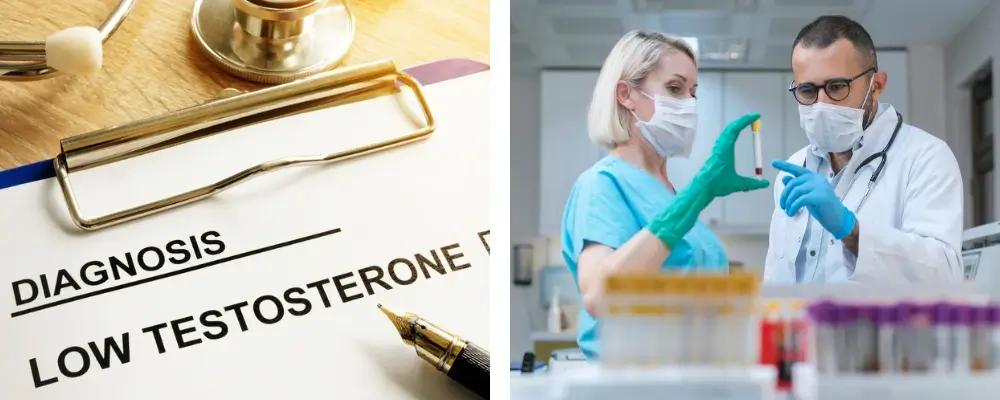Table of Contents
- Blood Tests for Low Testosterone
- How Is Low Testosterone Tested?
- Do I Need to Prepare for a Testosterone Blood Test?
- Should Women Be Tested for Low Testosterone Too?
- What Are Normal HGH Levels in Adults?
- What Are the Normal Testosterone Ranges in Men and Women?
- What Do My Testosterone Test Results Mean?
- Understanding HGH Blood Test Results
- HGH Blood Testing and Diagnosis
- How Should I Prepare for an HGH Test?
- What Do My HGH Test Results Indicate?
- Does It Matter Where You Get Your Hormones Tested?
- Frequently Asked Questions About Hormone Blood Testing
Successful hormone replacement therapy for adults begins with comprenhensive and accurate lab tests.
Before beginning any form of hormone optimization—whether it’s Testosterone Replacement Therapy (TRT) or Human Growth Hormone (HGH) Therapy—the first and most essential step is a detailed assessment of your current hormone levels. At Medzone Clinic, we emphasize comprehensive blood testing as the foundation for safe and personalized hormone care. While home test kits are available for some hormone imbalances, but at home collection cannot match the accuracy and integrity of an actual lab test.
Our medical team uses both focused and full-spectrum hormone panels to identify imbalances, with particular attention to testosterone and growth hormone. These tests also evaluate the activity of the hypothalamic-pituitary axis, the control center responsible for regulating key hormone production in your body.
Before ordering any hormone test panel, each patient undergoes a full physical exam and a careful review of medical history and symptoms. You’ll be asked about the nature of your symptoms, when they began, and how they may have progressed over time.
Blood Tests for Low Testosterone
If testosterone deficiency is suspected, lab testing is the most accurate way to confirm a diagnosis.
Testosterone plays a critical role in maintaining male vitality, muscle mass, sexual health, and mental sharpness—and it naturally declines with age. Low testosterone, or “Low T,” can lead to a range of physical, cognitive, and emotional symptoms.
A proper diagnostic approach includes a physical exam, clinical review of symptoms, and a blood test. Common symptoms of Low T include:
- Low energy or chronic fatigue
- Reduced libido or sexual performance
- Increased body fat or stubborn weight gain
- Muscle loss or weakness
- Mood instability, anxiety, or depressive symptoms
- Brain fog or trouble concentrating
How Is Low Testosterone Tested?
Testosterone is measured through a blood test that quantifies how much of the hormone is circulating in your bloodstream. Normal reference ranges for men are typically between 300–1,000 ng/dL, but levels fluctuate during the day. Because testosterone levels peak in the early morning, Medzone schedules testing during those hours for the most accurate readings.
Although some home kits use saliva, blood-based testing remains the clinical gold standard. We often evaluate total testosterone along with free testosterone to get a more complete picture of your hormonal health.
And while many general practitioners can order this test, working with the experienced hormone doctors at Medzone ensures that your results are interpreted in the context of age-related hormone decline—and that any treatment recommended is safe and tailored to your specific needs.

Do I Need to Prepare for a Testosterone Blood Test?
Generally, there’s no major preparation needed, though the time of day is key, with morning sample collection preferred. Testosterone exists in two primary forms in your blood: one bound to proteins like SHBG (sex hormone-binding globulin) and the other in a “free” state. Free testosterone is the bioavailable form that your body can use right away.
Basic hormone panels often test only total testosterone, but at Medzone, we frequently assess both total and free testosterone to better understand your hormonal baseline and design the most effective treatment plan possible.
Should Women Be Tested for Low Testosterone Too?
Absolutely. While testosterone is critical to men’s health, it isn’t just a male hormone—women also produce and need testosterone. Female testosterone levels drop as women age. Menopausal women in particular need to understand how this decline can affect energy, mood, and sexual health. However, regardless of age, we include testosterone screening in all of our women’s hormone test panels.
For women experiencing symptoms such as fatigue, low libido, or cognitive changes, testosterone testing may uncover a hormonal imbalance that can be addressed safely and effectively with TRT treatment.
What Are Normal HGH Levels in Adults?
Human Growth Hormone isn’t released constantly like other hormones—it’s secreted in pulses, especially during sleep. Because of this, a single HGH reading doesn’t offer a reliable diagnosis. Instead, doctors use IGF-1 (Insulin-Like Growth Factor 1) testing as a more stable indicator of average HGH activity.
Typical IGF-1 reference ranges by age and gender include:
- Men ages 20–40: 200–450 ng/mL
- Men over 40: 100–300 ng/mL
- Women ages 20–40: 150–400 ng/mL
- Women over 40: 100–275 ng/mL
If your levels are consistently low and you’re experiencing symptoms such as loss of vitality, poor muscle tone, or memory issues, Medzone may recommend further testing to evaluate for adult growth hormone deficiency.
What Are the Normal Testosterone Ranges in Men and Women?
Hormone levels fluctuate based on numerous factors, including time of day, age, and stress. That’s why we conduct blood tests in the morning, to account for such hormonal shifts. AM is when your testosterone levels are at their highest.
Standard ranges for total testosterone:
- Adult men: 300–1,000 ng/dL
- Adult women: 15–70 ng/dL
Because total testosterone alone doesn’t tell the whole story, Medzone often measures free testosterone to assess how much is actually usable by your body. Some patients may show “normal” total testosterone but still have symptoms due to low free testosterone.
What Do My Testosterone Test Results Mean?
If your lab results confirm low testosterone, Medzone Clinic may recommend Testosterone Replacement Therapy. TRT can be administered via injection, transdermal patch, cream, oral tablet, or implantable pellets. Based on clinical outcomes, we’ve found that testosterone injections offer the most consistent and effective results.
Patients who begin TRT often report improvements in:
- Energy and stamina
- Libido and sexual function
- Mental clarity and memory
- Mood and emotional balance
- Muscle mass and fat loss
- Quality of sleep
- Reduced depressive symptoms
Only a blood test can confirm if low testosterone is the cause of your symptoms and whether TRT is right for you.
Understanding HGH Blood Test Results
To receive growth hormone therapy, a clinical diagnosis of growth hormone deficiency (GHD) must first be established. Because HGH fluctuates, diagnosis isn’t based on a single reading. Instead, Medzone may perform HGH stimulation or suppression testing.
HGH Blood Testing and Diagnosis
Rather than relying solely on a static blood draw, we assess how well your pituitary gland responds to stimulation. During a stimulation test, you may be given a specific agent to trigger HGH release, followed by timed blood samples.
An IGF-1 test is also commonly performed, as it provides a more consistent snapshot of long-term HGH levels.
How Should I Prepare for an HGH Test?
Depending on the method used, preparation may include:
- Fasting for a designated period
- Pausing certain medications
- Engaging in light physical activity
- Taking a stimulant as directed
Your healthcare provider will give you detailed instructions tailored to your specific test.
What Do My HGH Test Results Indicate?
If your results indicate low HGH activity, you may benefit from prescription HGH injections.
Documented benefits of HGH therapy for adults with deficiency may include:
- More energy and stamina
- Increased lean muscle mass
- Decreased stubborn body fat
- Enhanced libido and sexual wellness
- Improved mental clarity and mood
- Better quality sleep
At Medzone Clinic, growth hormone therapy is always customized —never one-size-fits-all. Accurate testing and diagnosis are key to ensuring you get what your body actually needs.

Does It Matter Where You Get Your Hormones Tested?
Any healthcare provider can order a hormone blood test. But, if you want to get an accurate picture of your hormonal status, it absolutely matters where you get your hormone levels tested. While at-home tests can offer convenience and potentially lower costs, they may not always provide the same level of accuracy as professional lab panels. At Medzone we make hormone diagnostics he cornerstone of your treatment and interprete your results in the context of your overall health. No home test can do that.
Our commitment to accurate hormone testing is only part of how we are revolutionizing hormone replacement and anti-aging care for men and women. We believe that every person who walks through our doors deserves a personalized approach to their health.
Our team of dedicated HRT specialists is here to listen, understand, and provide guidance every step of the way. From your first consultation to your ongoing care, we prioritize your comfort and well-being.
When you choose a Medzone Clinic near you for hormone testing and treatment, you’re not just receiving five-star medical care, you’re gaining a partner committed to helping you thrive.
Discover the difference our personalized, compassionate care can make in your life by contacting us today.
Frequently Asked Questions About Hormone Blood Testing
1. Why is blood testing necessary before starting HRT?
Hormone therapy without lab work is like flying blind. A blood test helps your healthcare provider identify imbalances and ensures your treatment is both safe and effective. Medzone bases every therapy on clinical data—not guesswork.
2. Does health insurance cover lab tests?
Depending on your medical insurance there you could covered for lab tests and doctor ordered blood work.
3. What’s the difference between total and free testosterone?
Total testosterone includes all testosterone in your blood, while free testosterone reflects the portion your body can use. Medzone tests both to give you a complete profile.
4. When should I schedule my testosterone blood test?
Test in the morning, ideally between 7 and 10 a.m., when levels are naturally highest. Medzone schedules morning draws for optimal accuracy.
5. Can I eat or take medicine before a hormone blood test?
Fasting instruction and any other info will be provided depending on the test. For routine testosterone or IGF-1, fasting isn’t needed. For HGH stimulation tests, you may need to fast or pause certain medications. Your provider will let you know.
6. How quickly do results come in?
Most results are available within 2–3 business days. Once received, a Medzone physician will walk you through your results and explain next steps if treatment is needed.
7. Can women benefit from hormone blood testing?
Absolutely. Women can experience imbalances in testosterone, estrogen, and HGH, especially around menopause. Medzone offers hormone testing and personalized treatment plans for both men and women.
8. Are testosterones and HGH the only hormones tested for?
No, depending on your symptom, our comprehensive hormone blood panels, may include testing for thyroid stimulating hormone (TSH), luteinizing hormone, (LH), follicle-stimulating hormone (FSH), adrenal hormones, and more. Your healthcare provider will order the right tests for you
